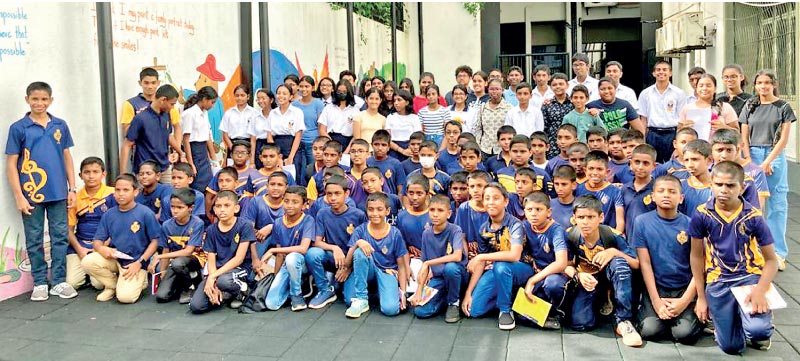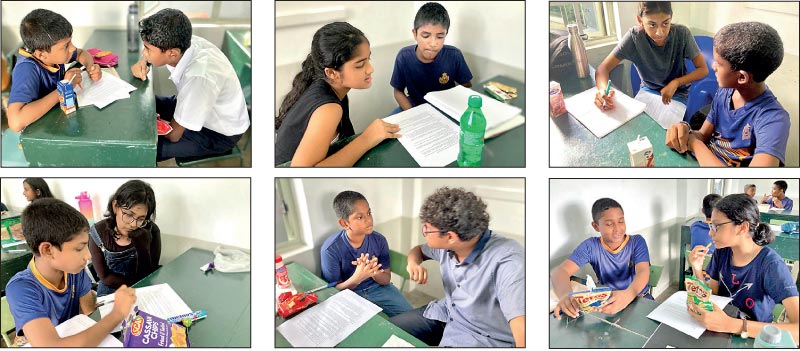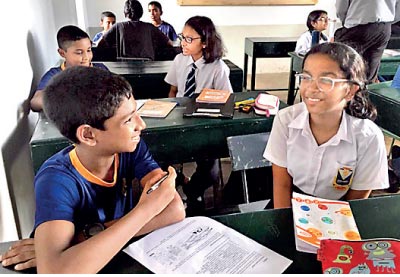Saturday Feb 21, 2026
Saturday Feb 21, 2026
Monday, 4 December 2023 00:22 - - {{hitsCtrl.values.hits}}


By Padmasena Dissanayake
 The soul of a school is its hostel. People would judge a school by how it takes care of the children entrusted to its hostel. This is so true of a school like Royal College where over 360 of the nation’s brightest from the furthest corners are boarded.
The soul of a school is its hostel. People would judge a school by how it takes care of the children entrusted to its hostel. This is so true of a school like Royal College where over 360 of the nation’s brightest from the furthest corners are boarded.
While walking back to the Royal College Hostel (RCH) after the inaugural session with his peer Teacher, Sandaru Abhiman (real name) from Kamburugamuwa (Matara) summed it all perfectly. “The person who I am most comfortable with is my Dad. In today’s session, I felt as if I was with him.”
The Project is named Royal – Stafford Peer Teaching Program. The objective is to practise English language skills with a focus on verbal communication. The expected outcome would be the hostellers losing their fear, shyness, reluctance and lack of confidence to communicate in English and reaching the same level of an average Stafford student. The hostellers are all from Grade 7 and their peer Teachers from Grades 9 and 10.
There are 72 students in Grade 7 at the RCH. They have come from 17 distant districts such as, Ampara, Moneragala, Hambantota, Trincomalee, Nuwara Eliya, Badulla, Anuradhapura, Polonnaruwa, Matara, Galle, Kurunegala, Kegalle, Matale, Ratnapura, Puttalam, Kalutara and Gampaha. Only the highest achievers at the Grade 5 Scholarship Exam are admitted to Royal College (RC) and only those from most distant areas are accepted to the hostel.
Inability to communicate in English
One of the biggest setbacks a rural child encounters at RC is his inability to communicate in English. He is clearly ahead in other areas of studies but is at a distinct disadvantage when he is surrounded by class-mates who come from English speaking homes. Also, the fact that more often than not, English speaking is related to a higher class creates a lasting psychological impact in the minds of a young rural child, sometimes staying with him for the rest of his life.
The experiment also had a few other goals where the hostellers were concerned. At the tender age of 11, a child is removed from a loving family, brought into a completely different world and very contrasting culture and customs, and warded in a large home not much different from a prison. For the first time he comes under a set of rules and regulations that rule his life from waking hours until he falls into sleep. There’s no mother to run to, play when he wants to and sleep when he feels like. There›s time to eat and time to study. There’s a time to play and time to rest but the point is, it’s all regulated and under close supervision. May be the rules are there to be broken but every time a rule is broken there would be punishment. I have watched with a broken heart how these young kids call their Moms during the early months of ‘incarceration” and it’s heartbreaking. As a doting Grandpa of grandkids of their age, I have been watching them with a crying heart, for all of them are crying and pleading with their Moms to take them back to their homes and Heaven, to running in freshly harvested fields and jumping into cool streams. But then I have also observed how a larger majority of them come round, get used to the regimental living and even blossom later on. If I had my say, I would never permit this separation so early, may be at Grade 10 or so when they are gradually becoming independent. But then, who am I to decide after listening to two Dads from two entirely opposing locations and hundreds of miles apart?
I want to enter Royal College Colombo
One Dad from Hurigaswewa (Anuradhapura) told me, his son, when in Grade 3, once asked him what’s the best school in the island and Dad had no hesitation naming Royal College Colombo. And the son had asked him how he could get in and Dad said through the Scholarship Exam. The Dad swore to me, from that day, his son needed no further encouragement and it was no wonder the boy became number one from his district.
The other story came from Angunakolapelassa. The Dad ran a small but successful business, a hardware shop and even owned a “dimo batta”. He suddenly developed kidney failure (a common and deadly illness in rural Sri Lanka) and one surgery followed another. It all happened in quick succession. When he was doing well, he had asked his son what reward he would want most if he passed the Scholarship Exam with flying colours. The boy had instantly responded with, “a bike”. When the results came the family had hit rock bottom and after seeing his excellent results, the son changed his wish; I want to enter RC, he said firmly. The Dad, being well aware of the cost of “free education” had tried his best to persuade the son with the most expensive bike because as he confessed to me, it was far more cheaper than a seven year education in Colombo. The son rolled on the floor crying his heart out and the loving Dad had relented. So here again I am asking myself, who are we to judge?
Love, kindness, empathy triumph all else
This experiment had other goals. The first was to take them out, away from the hostel walls and give them some fresh air, strolling ten minutes to Stafford once a week; sitting alongside both boys and girls a few years senior, to practise conversation, in classrooms but not quite classrooms. Hostellers were naturally hesitant and extra cautious at the beginning until they realised how free-spirited their counterparts were. They were oozing with kindness and love! They showered them with snacks that were way beyond a hosteller’s reach. And they realised, without anyone telling them, these international kids weren’t much different to them where it truly mattered, and however different their social standings were, they could be friends for life. It boosted their confidence and self assurance. There couldn’t have been a better experiment in bringing two kids separated from worlds apart on many aspects; but love, kindness, empathy triumphed all else.
Time to pull down all walls
I felt it made an equally deep impact on the Staffordians too. For the first time they sat beside a kid who had to struggle each day of his life to get this far, where difficulties were so much part and parcel of his life. And probably it was the first time they had ever heard of the names of the villages they came from. And would have realised this was far more than improving their communication skills; it’s giving them confidence to reach the stars, and perhaps, even beyond. And I just couldn’t help wondering; isn’t there a wonderful lesson for all other International Schools and Public Schools in the city where rural kids are boarded? Isn’t it time to pull down all walls around us and create collaborations to change the lives of the sons and daughters of the soil, Sri Lanka’s future hopes?
And the best lesson for me was; there’s so much good around, if one knew where to look and have the courage to hack new paths each day!